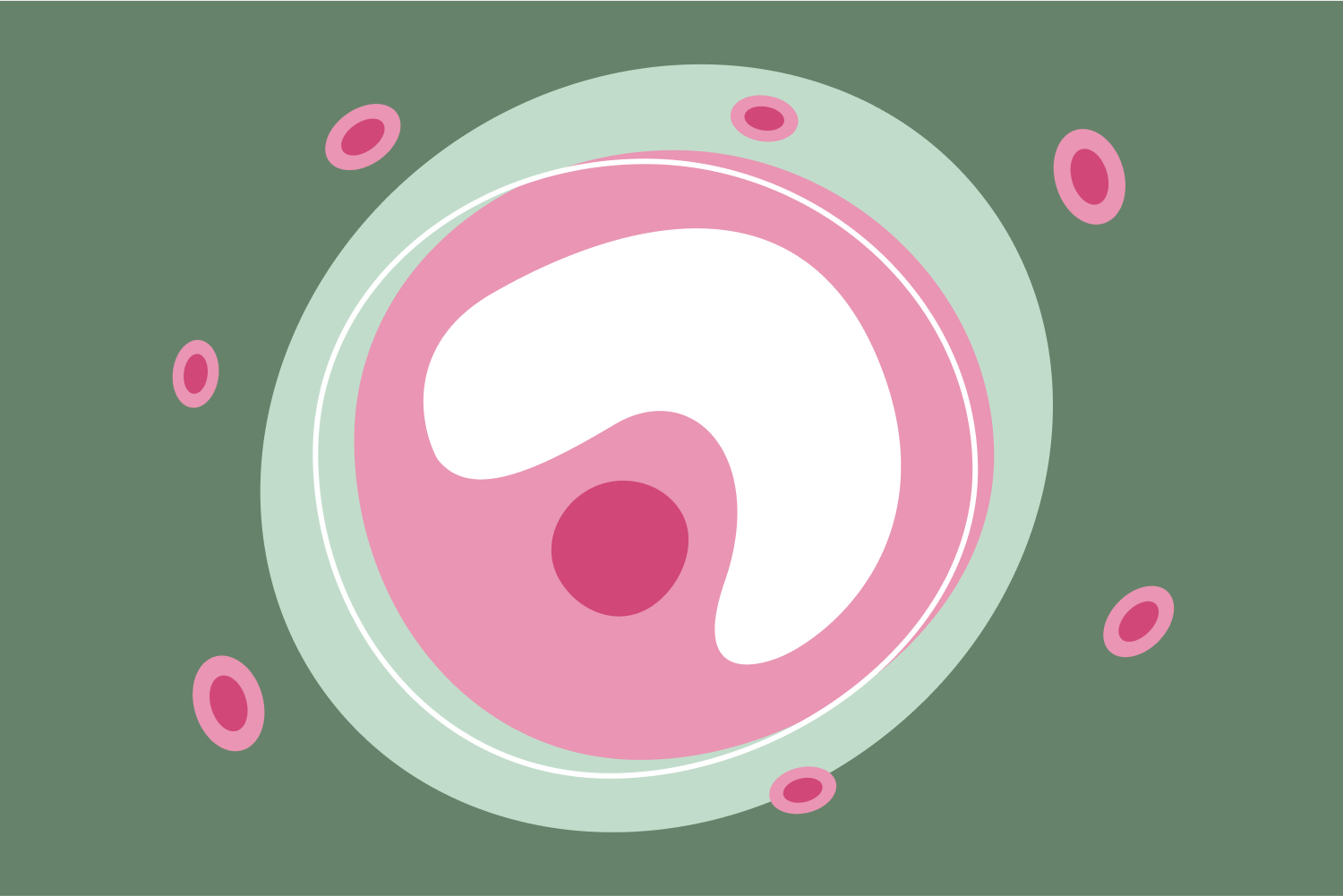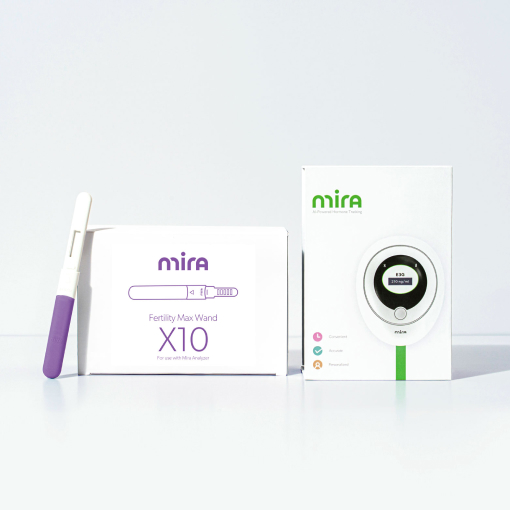What is FSH? A Guide to the Follicle-Stimulating Hormone

When it comes to getting pregnant, we all know just how critical the surge in luteinizing hormone (LH) is for ovulation.
However, long before your LH surge during the follicular phase, there’s another key hormone at play. Known as FSH (follicle-stimulating hormone), this hormone is responsible for making sure that an egg is properly developed and ready for release through ovulation.
Want to learn more?
In this article, we’ll cover everything you need to know about what FSH does, what your FSH levels mean, and how to have your body’s FSH levels tested. We’ll also address some of your most frequently asked questions about this very special hormone!
While FSH is produced by both men and women, please note that this article focuses on the role that FSH plays in the female reproductive process.
What is FSH (Follicle-Stimulating Hormone)?
FSH is one of two gonadotropic hormones produced by the pituitary gland. The other gonadotrophic hormone is luteinizing hormone (LH) and these hormones work alongside each other to facilitate the reproductive process.
The role of FSH specifically is to help regulate the menstrual cycle, stimulate the development of premature ovarian follicles (which will eventually release an egg during ovulation), and ramp up the production of estrogen during the follicular phase.
For more information on the specific role of LH in the reproductive process, please check out our articles Understanding Your LH Surge & How It Impacts Pregnancy and LH Levels: Understanding Normal Ranges and The Benefit of Testing.
Why is FSH important?
FSH is important for two reasons. First of all, without FSH, early ovarian follicles would not be able to develop. This is crucial because these follicles eventually develop the egg that is released during ovulation.
The second reason why FSH is so important is because of its role in helping to increase the production of estrogen. This increase in estrogen helps to thicken the uterine lining, which in turn helps to support the implantation process.
FSH and pregnancy
FSH does not play a major role in pregnancy and the body halts all processes related to ovulation during this time. FSH levels in blood tend to stay below 0.1 mIU/mL during pregnancy which is a stark contrast to the 1.4-9.9 mIU/mL threshold that is typically reached during the follicular phase in non-pregnant women.

Testing FSH levels
What is FSH testing used for
In certain situations, it may be necessary to have your FSH levels tested. This is particularly true if you are:
- Struggling to become pregnant
- Experiencing irregular menstrual cycles
- Experiencing missed periods
- Approaching the age of perimenopause or menopause
- Experiencing abnormal symptoms of fatigue, weight loss, or decreased appetite
By testing and evaluating your FSH levels, your doctor will be able to gain insight into the reasons why you may be having difficulties with regulating your cycle or getting pregnant. They can also use this test to determine whether or not you are in the beginning phases of menopause.
Take the Quiz!
Tell us your fertility goal and we'll give you a perfect product match
Why FSH levels are important
Monitoring FSH is important because it can give your doctor insight into various health and fertility concerns. This includes:
- The functioning of the ovaries, pituitary, or hypothalamus.
- The quantity of your eggs (also known as your “ovarian reserve”).
- The potential effectiveness of certain fertility treatments and the likelihood of pregnancy.
How to test FSH
Blood
The most common way to check your exact FSH levels is by having your blood tested. This can either be done at your doctor’s office with a standard blood test, or it’s also possible to use an at-home blood testing service such as LetsGetChecked or EverlyWell.
Both options come with their pros and cons. For example, scheduling an in-person visit to your doctor’s office to have a blood test may not be feasible with your current schedule. It may also be expensive if your insurance does not cover this type of test. On the other hand, while at-home FSH testing may be more convenient and less expensive for some, it’s important to note that you will have to interpret your results on your own without the help of a doctor.
If you have been struggling to get pregnant or regulate your menstrual cycle for some time, it’s probably best to have a blood test at your doctor’s office in order to receive the most thorough medical advice for your situation. However, if you are simply approaching the age of menopause and curious about your ovarian reserves, an at-home blood test kit would be suitable.
Urine
It is also possible to test for FSH at home with urine testing. This can be done with basic fertility/menopause test strips (similar to pregnancy or ovulation tests). Or, it can be done with Mira’s Ovum Wands.
Please note: only a healthcare professional can confirm your menopause stage.
Again, both testing methods come with their own pros and cons. With fertility test strips, you will only be able to confirm whether or not your FSH levels are above the standard threshold for menopause. This may be enough information for you if you are already approaching menopause and do not want to plan a pregnancy.
On the other hand, testing with Mira’s Ovum Wands will allow you to track your exact FSH concentration levels in urine over time. This could be useful for a few reasons:
- To predict menopause – studies show that FSH levels rise approximately 2 years before your final menstrual period.
- To assist in ovulation prediction (together with other fertility hormones). Studies show that there is a peak in FSH levels approximately 2 hours before ovulation, with urinary FSH levels peaking within 1 day of follicular collapse (i.e. ovulation).
- To see your dynamic FSH patterns from cycle to cycle.
Many individuals prefer at-home testing because it is more comfortable, private, and oftentimes less expensive compared to regular doctor’s visits. However, if you are continuing to experience irregular cycles, difficulties with getting pregnant, and abnormal symptoms of fatigue or weight loss, it’s a good idea to book yourself in for a check-up at your doctor’s office.
Understanding the results
Normal
Because FSH levels vary throughout the menstrual cycle and throughout a woman’s life, it’s important to note that what’s considered “normal” can vary. Here is a brief overview of what you can expect at various phases.
FSH Levels in Blood
The below figures taken from The University of Rochester Medical Center Encyclopedia. For a more in-depth discussion on FSH levels, check out our article FSH Levels in Women: What’s Normal? (+ FSH Levels Chart).
- Follicular Phase: 1.4 to 9.9 mIU/mL
- Ovulation (Peak): 6.2 to 17.2 mIU/mL
- Luteal Phase: 1.1 to 9.2 mIU/mL
- Pregnancy: <0.1 mIU/mL
- Perimenopause: 1.4 mIU/mL to 30+ mIU/mL
- Menopause: 19 to 100 mIU/mL
FSH Levels in Urine
The below figures are based on Mira’s latest data.
- Follicular Phase: 1 to 14 mIU/mL
- Ovulation (Peak): 10 to 30 mIU/mL
- Luteal Phase: 1 to 15 mIU/mL
- Pregnancy: No data
- <40 years old: 1 mIU/mL to 24 mIU/mL
- >40 years old: 2 to 67 mIU/mL
Too high
When FSH levels are higher than the “normal” range, this is often a sign that more FSH is needed in order to help eggs in the ovaries mature – implying that the quantity of eggs is low. This is perfectly normal as you age into your 40s and 50s and approach menopause.
However, if you are still in your 20s and 30s and are still experiencing higher than average FSH levels, this may be a sign that your ovaries are not functioning the way they should. For example, Primary Ovarian Insufficiency (POI) is one condition that may cause FSH levels to be too high. POI affects less than 1% of women and often causes irregular menstrual cycles and fertility problems.
Too low
When FSH levels are lower than normal, this may be a sign of a pituitary disorder – such as hypopituitarism. This condition is rare and can cause disruptions to your hormones in general. In addition to low FSH levels, other symptoms of hypopituitarism include weight fluctuations, fatigue, anemia, stomach pain, and excessive thirst.
Other conditions that may cause low FSH levels include polycystic ovarian syndrome (PCOS), Kallmann syndrome, and low body weight.
What are the risks to testing?
There is minimal risk involved with having your FSH levels tested.
With at-home testing, the only potential risk is receiving inaccurate results due to improper use of the test kit. This is why it’s important to always follow the directions precisely, and make sure to reach out to your doctor if you have any questions or are uncomfortable with your results.
With blood testing at your doctor’s office, the only risk factor is the typical light pain and bruising commonly experienced during a blood serum test.
How do you treat FSH?
To treat certain fertility issues, FSH can be administered as an injection. This is known as an FSH treatment, and it is often administered together with human chorionic gonadotropin (hCG). With this treatment, the ultimate goal is to facilitate the growth of ovarian follicles and stimulate ovulation in order to help the patient become pregnant. Such a treatment may be a part of in-vitro fertilization (IVF).
Follicle-Stimulating Hormone (FSH) FAQ:
When should you get an FSH test?
Doctors often recommend getting an FSH test on day 3 of your menstrual cycle (day 1 being the first day of your period). This is because FSH levels vary throughout the cycle, and it’s critical to get an early estimation of what your “baseline” FSH levels are.
Can stress affect FSH levels?
Yes. Stress can affect your overall hormone levels including FSH specifically. In fact, one study found stress to be associated with higher than normal FSH levels. If you struggle with chronic stress, bear in mind that this can have a negative effect on your menstrual cycle, ability to get pregnant, and overall health.
For more information on how to cope with stress while trying to conceive, check out our article Stress and Fertility: How It’s Connected and How to Manage It.
How can I increase my FSH levels naturally?
In addition to speaking with your doctor about potential treatment options for increasing your FSH levels, there are also a few lifestyle changes you can make that may help. For example, reducing soy intake may help to increase FSH levels naturally. This is backed by one research study which found that too much soy protein may cause FSH levels to be low.
Other things you can do to balance FSH (and your hormones in general) is to:
*Maintain a healthy diet rich in protein, healthy fats, and fiber
*Exercise regularly
*Get at least 7 or more hours of sleep each night
*Keep stress levels to a minimum
For more tips on balancing your hormones, check out our article 7 Methods to Balance Your Hormones Naturally.
Recommended for you
Navigate your fertility with peace of mind
Mira’s Editorial Process
All content produced by Mira meets stringent editorial standards, ensuring excellence and accuracy in language and medical precision. Every piece undergoes thorough fact-checking and review by qualified professionals. Check out our full editorial process to learn more.

















